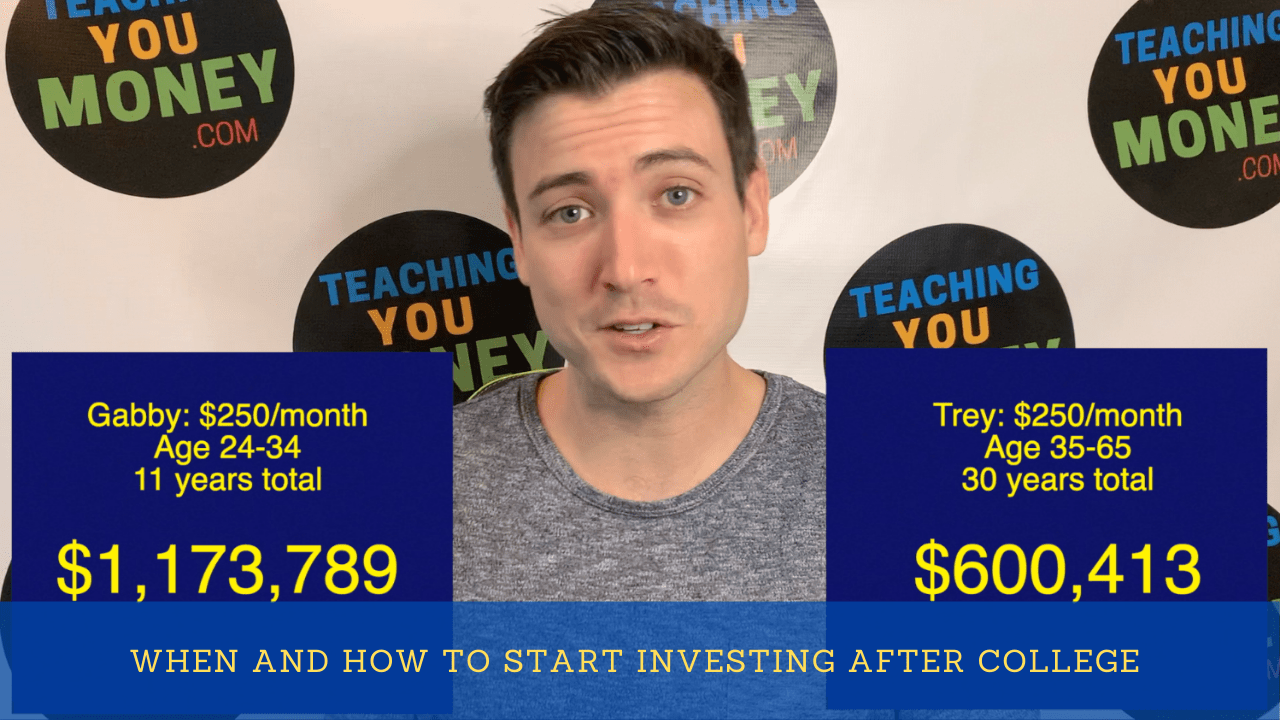When and How to Start Investing After College
“When do I start investing after college? And how do I get started?” These are really good questions. Along with questions like, “Should I get a financial advisor? What funds are best to grow my money?” and “How quickly should I pay off my student loans?” The answers to these questions can set the foundation for a successful money journey.
**I am not a financial advisor so this is not legal advice**
My Story
I graduated college without any student debt. This was partly because I had financial help from my parents (and yes, I recognize how privileged this makes me), partly because I trained with the Army for a year on a full college scholarship, and partly because after my time with the Army, I applied for several other scholarships and was awarded a few that helped quite a bit.
My question after college immediately became, “When should I start investing for the future, and how do I best do it?”
My First Financial Meetings
One of my college acquaintances had also just graduated and started a career at Northwestern Mutual. He knew I didn’t have any student loans and was starting my own career, so he invited me to sit down with him and his boss to assess my financial future.
I never really felt comfortable during this time. Not because they were sleazy guys or I didn’t trust them, but because I really didn’t know anything about how to invest my money. They could literally tell me anything and I would believe it. I was too naïve to feel comfortable doing anything with my money, so instead, I decided not to work with them and started saving as much money as I could in my bank account with US Bank.
About two years later, I had another Northwestern Mutual representative approach me about being my financial advisor. This was an older guy who I immediately trusted because he took the concept of growing my money very seriously. It was in his personality not to joke around or laugh anything off. If I had a question, he gave me a straight answer. I liked that, so I signed on and started using his services as my financial advisor.
What You Don’t Know Can Hurt You
At this point in my life, I was still in my early 20’s and didn’t know the difference between a broker and a fiduciary. I didn’t know anything about index funds. I didn’t know my stance on investing through life-insurance. And I had no idea about the fees I was being charged to invest with my financial advisor into actively managed funds.
I picked up several books on money, and that’s where this journey really began. I started to define my own investing needs. Books by Tony Robbins like Unshakable and Money Master the Game taught me about advisory fees and how much they can cut into retirement savings. I went away from life insurance as a savings tool as well as the fees that come along with actively managed funds. And because of all these shifts in my money mindset, I switched my financial advisor to Creative Planning – a fiduciary financial advising firm that aligns more closely with my investing beliefs.
I wish someone would have told me some of these things earlier. My investment accounts could have had thousands more in them if I hadn’t waited several years to get started. I also
“lost” even more money because I hadn’t clearly defined my goals before choosing an advisor.
Here are some tips I’d recommend for you as soon as you graduate from college:
1. Assess Your Current Situation
If you have piles and piles of student loans staring you in the face, these need to be your first priority. You need to put every extra penny you make towards paying these off as quickly as possible. The interest rate on these will crush you over time.
If, on the other hand, you’ve managed to graduate debt-free, you’ll have the ability to get ahead of the game if you know exactly what your goals are. Upon getting your first job, you’ll want to set aside 3 months of your current expenses as an emergency fund, then start investing your money heavily into a long-term account.
Every situation is different. Maybe you want to take a year off and travel the world. Maybe you want to start your own business. With each scenario comes new variations of what you can do with your money in a very interesting decision matrix.
2. Understand the Importance of Compound Interest
The earlier you start investing your money for your future, the more time it has to grow. I’ve said it a million times before, but compound interest is the most magical tool in the money game.
Peter Mallouk, the founder of Creative Planning, put it this way:
“It’s not just how much you save, but how early you save it.
Gabby saves $250/month from age 24 to 34 then stops. 11 years total.
Trey saves $250/month from ages 35 to 65. 30 years total.
At age 65, Gabby ends up with $1,173,789 and Trey ends up with $600,413.
Start saving today!”
This example estimates a 10% rate of return each year compounding on itself over time. It shows just how important it is to start saving money as early as possible. If you want to travel the world for a year after college, that’s amazing! I would never persuade you to deny yourself such an amazing learning experience. However, if that one year of travel turns into ten years of soul-searching and joblessness, you’ll be placing yourself in a financial hole that will be difficult to fill in.
Time is your friend when it comes to investing. The money moves you make early on make a huge difference in your future financial situation.
3. Eliminate Your Debt
I’ve already touched on this briefly when assessing your current situation so I won’t go too deep here. Debt will crush you if you allow it to continue to grow. I believe in using the debt snowball system. Find your loan with the largest interest rate, overpay on that loan as much as possible until it is eliminated. Then use the money you were paying towards that loan (as well as the overpayment) to start paying off the loan with the next largest interest rate. Do this until all your loans are eliminated. You’ll obviously have to continue paying the minimum payments on your other loans while using the snowball method, but this is the best way I’ve seen to eliminate debt.
4. Start an Emergency Fund
If you’re debt-free, you’ll want to be able to cover at least 3 months of your current expenses in case anything unexpected happens. Life happens. You may get injured and can’t work or get let go from your job. In these situations, it will be good to know that you have some money put away to support yourself in this time.
5. Start Investing
Now it’s time to get started – even if your goals aren’t fully defined or you aren’t sure where your life is headed. If you have eliminated your debt and started an emergency fund, you’ll want to start taking advantage of compound interest as early as possible. This can be in a 401k, Roth IRA, or other long-term investments.
How to Choose a Financial Advisor
Fiduciaries vs. Brokers
If you’d like to use a financial advisor, I’d strongly recommend finding a Registered Investment Advisor (RIA) who has a fiduciary agreement to do what is in your best interests. If you choose someone who is not an RIA, they would be considered a broker. A broker is someone who can make trades on your behalf but doesn’t have a legal obligation to do what is in your best interests. This means they can sell you funds that may not be best for you, which is not good. The reason they’d do this is to earn a higher commission. I don’t like this scenario at all. I’d rather be working with someone who is legally obligated to do what they think is best for me and my financial future – this is what a fiduciary agreement is and most Registered Investment Advisor adhere to this legally binding agreement.
You can simply ask an advisor, “Are you a Registered Investment Advisor?” as well as “Are you a fiduciary?” These questions will tell you very quickly whether they must keep your best interests in mind or if they can sell you whatever they want.
Robo-Advisors
If you choose not use a financial advisor at all, I would recommend getting set up with a low-fee “robo-advisor” that places money into index funds on your behalf. I’m a big fan of low cost index funds. You’ll have less decisions to make and get the benefit of following the market. If you don’t really know what you’re doing from a financial standpoint, DO NOT try to buy individual stocks or day trade. Buying the index protects your investment and historically has performed well against actively managed funds (especially when you include the fees associated with them). A “robo-advisor” you might look into is Blooom. They charge low fees and are simple to set up for any college grad.
—
I hope this has been helpful. I’d love to hear from you as it relates to investing after college. Leave your investing experience in the comments below!
Be sure to keep up with Teaching You Money. We’re here to help you shift your money mindset, grow your knowledge, and build your wealth.



